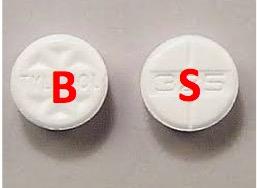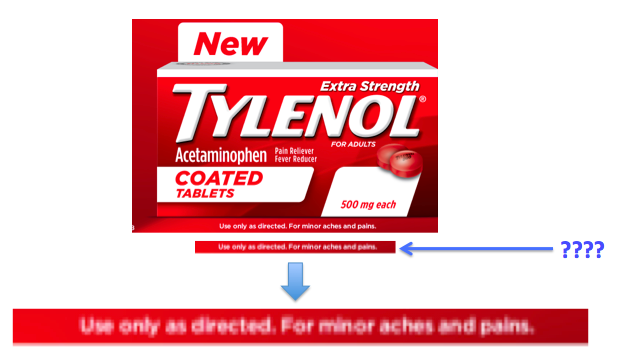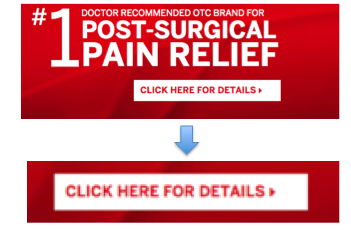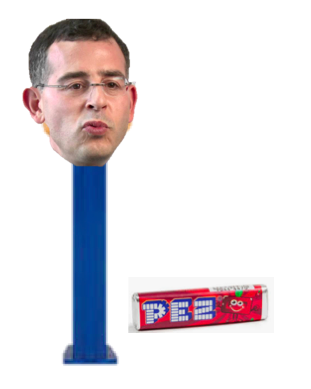
If you're in the mood to get really pissed off feel free to visit Tylenol.com. But don't say I didn't warn you.
Of course, this is just my opinion, but it would seem that Johnson and Johnson is doing a splendid job of trying to boost Tylenol sales by using a none-too-well-concealed attempt to exploit the anti-opioid jihad that continues to run rampant in the U.S., despite overwhelming evidence that war against pain medications has done very little good and very much harm.
1. Johnson and Johnson tries to modernize. And capitalize.
Maybe the company is trying out a new slogan.
Old:
"No More Tears®"
New:
"No More Scruples"
2. Confusing labels.
There are at least three items on the Tylenol website that suggest that J&J is trying to cash in on the opioid crisis, a big no-no in my book.
Let's start with some of the language on the label. It not only makes no sense but, in fact, appears to be self-contradictory. Here is part of it:

(Figure 1) Is Tylenol really useful for post-surgical pain? Source:Tylenol.com
I don't know what parameters J&J used to make the claim that Tylenol is the "#1 Doctor recommended OTC Brand for Post-Surgical Pain Relief." Because if you look a little more carefully at the rest of label you'll run into the following (in much smaller letters):

(Figure 2) Translation: "Use only as directed. For minor aches and pains." Image: Tylenol.com
3. You can't have it both ways.
Perhaps you are now asking yourself, "Hmm. if the stuff is meant to be used for minor aches and pains then how can J&J be touting it as the #1 doctor recommended drug for post-surgical pain? Something doesn't add up here. Post-surgical pain is usually not "minor." Perhaps the company can explain which of these statements is true. Is Tylenol really so great for post-op pain, such as that from a knee replacement? Or is it more suitable scraped knee?
Based on my own experience with the stuff I'd rather take this. It won't make me feel any better, but at least it's yummy!

Photo: Open Food Facts
Have severe pain after surgery? Ask if the hospital pharmacy carries this. Works about as well and Tylenol, but it tastes better.
4. Bottom feeders and the bottom line.
If you click on an innocuous looking button - CLICK HERE FOR DETAILS - it would seem that the company has finally revealed its intentions.


$hamless. Source. Tylenol.com
Whoa! Why on earth would a company that makes Tylenol put "opioid-free tablets" in the product description? Here's my best guess.
That phrase in the red box cannot be there by accident. Since opioid analgesic pills are now (wrongly) equated with "deadly" J&J probably figured that it could score some cheap points by restating the obvious: Tylenol doesn't contain any opioid; it never did (1). So consumers should feel perfectly comfortable buying a drug that is strong enough for post-surgical pain (No - it barely works for anything. See Note #2) and safe (It's not so safe either. See Note #3.)
There sure is a lot of double talk in the Tylenol campaign. It sounds vaguely familiar, the use of trickery - half-truths and partial facts to make a point. Where might we have seen something of this nature? Let me think it over for a moment.
Oh, yeah. It's this.

Andrew "Pez Head" Kolodny
NOTES:
(1) Exception: tylenol-codeine combinations like Tylenol #3, which are prescription drugs.
(2) The following conclusions were taken from Cochrane reviews of the quality of evidence of efficacy of acetaminophen (or the lack thereof) to treat certain conditions. Originally in the article Tylenol Isn't So Safe, But At Least It Works, Right?
- Osteoarthritis of the Knee and Hip - "In conclusion, there is little evidence to support the efficacy of acetaminophen treatment in patients with chronic pain conditions."
- Acute and Chronic Lower Back Pain - "We found high-quality evidence that paracetamol (4 g per day) is no better than placebo for relieving acute LBP in either the short or longer term. It also worked no better than placebo on the other aspects studied, such as quality of life and sleep quality."
- Back Pain, and Hip and Knee Osteoarthritis - "Paracetamol is ineffective in the treatment of low back pain and provides minimal short term benefit for people with osteoarthritis. These results support the reconsideration of recommendations to use paracetamol for patients with low back pain and osteoarthritis of the hip or knee in clinical practice guidelines."
- Headaches - "The outcome of being pain free or having only mild pain at two hours was reported by 59 in 100 people taking paracetamol 1000 mg..." but "[the same result was seen in "49 out of 100 people taking placebo."
- Colds - "The data in this review do not provide sufficient evidence to inform practice regarding the use of acetaminophen for the common cold in adults."
- Fever - "[Tylenol] and ibuprofen lower the child's temperature and relieve their discomfort."
So, the only evidence-based indication for the utility of Tylenol (according to Cochrane reviews) is lowering children's fever. There is no strong evidence that it works well for anything else, although it does seem to amplify the analgesic ability of ibuprofen, and vice versa.
(2) Dr. Aric Hauseknect, a neurologist and pain management specialist in New York, makes this quite clear when in a 2017 interview. "Tylenol is by far the most dangerous drug ever made." See (See Pain In The Time Of Opioid Denial: An Interview With Aric Hausknecht, M.D.)



